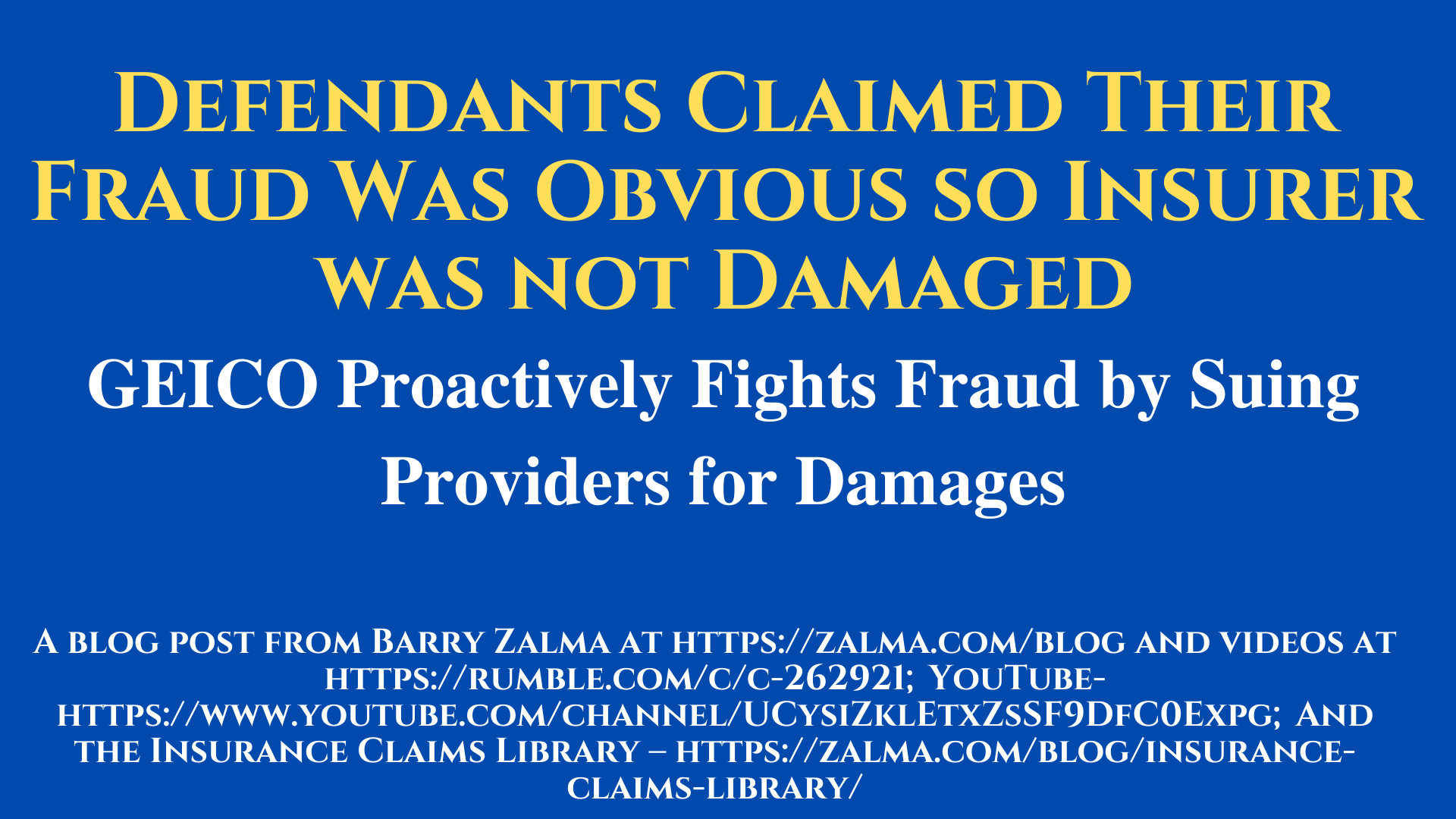-
News Feed
- EXPLORE
-
Pages
-
Groups
-
Events
-
Blogs
-
Marketplace
-
Offers
-
Jobs
-
Developers
It is not Defense to Claim Fraud was Obvious

GEICO Proactively Fights Fraud by Suing Providers for Damages
Read the full article at https://www.linkedin.com/pulse/defendants-claimed-fraud-obvious-so-insurer-damaged-zalma-esq-cfe and at https://zalma.com/blog plus more than 4000 posts.
When health care providers admit that they defrauded an insurer but claimed they were not liable because the fraud was so obvious the insurer could not prove the reliance element of common law fraud, their defense and appeal is contumacious. In Government Employees Insurance Co., GEICO Indemnity Company, GEICO Casualty Company, GEICO General Insurance Company v. Quality Diagnostic Health Care, Inc., et al., Jorge E. Martinez, Luis Anibal Queral, M.D., Moulton Keane, M.D., Ivelis Garcia, Michel Viera, LMT, No. 21-10297, United States Court of Appeals, Eleventh Circuit (November 5, 2021) the Eleventh Circuit refused to buy the ridiculous defense that it was GEICO’s fault that they successfully defrauded GEICO.
BACKGROUND
Th appeal arose from claims – submitted by Defendants to GEICO – for reimbursement under the Florida Motor Vehicle No-Fault Law, Fla. Stat. §§ 627.730-627.7405. Florida’s No-Fault Law requires automobile insurance policies to include personal-injury protection (“PIP”) coverage to provide persons injured in automobile accidents with benefits for medical treatment. Pursuant to a valid assignment of PIP benefits by the insured, the healthcare provider may submit claims directly to the insurance company to receive payment for medical services rendered.
The district court determined that none of Quality’s bills to GEICO were eligible for reimbursement under Florida’s No-Fault Law. Given Defendants’ knowing false representations the district court also granted summary judgment on GEICO’s claims for common law fraud and for violation of FDUTPA.
DISCUSSION
Much to the surprise of the trial court and GEICO, the defendants admitted the claims billed to GEICO inflated falsely the level of service provided and, thus, were upcoded and represented falsely that the physical therapy services had been provided by or under the direct supervision of a licensed physician.
Regardless of the admission of fraud, the defendants contended that GEICO could not show justifiable reliance because GEICO knew or should have known that Defendants’ claims misrepresented the nature and extent of the patient examinations.
ZALMA OPINION
It takes a great deal of unmitigated gall to appeal an adverse judgment after admitting that the conduct that resulted in a summary judgment in favor of GEICO after the defendants admitted that they had defrauded GEICO and raised the silly argument that GEICO should not have paid the fraudulent billing since they were obviously fraudulent.
© 2021 – Barry Zalma
We are 100% funded for October.
Thanks to everyone who helped out. 🥰
Xephula monthly operating expenses for 2024 - Server: $143/month - Backup Software: $6/month - Object Storage: $6/month - SMTP Service: $10/month - Stripe Processing Fees: ~$10/month - Total: $175/month
- Art
- Causes
- Crafts
- Crime
- Dance
- Drinks
- Film
- Finance
- Fitness
- Food
- Games
- Gardening
- Health
- Home
- Literature
- Music
- Networking
- Paranormal
- Other
- Politics
- History
- News
- Party
- Science
- Religion
- Shopping
- Sports
- SyFy
- Politically Incorrect
- Philosophy
- Theater
- Technology
- Wellness



